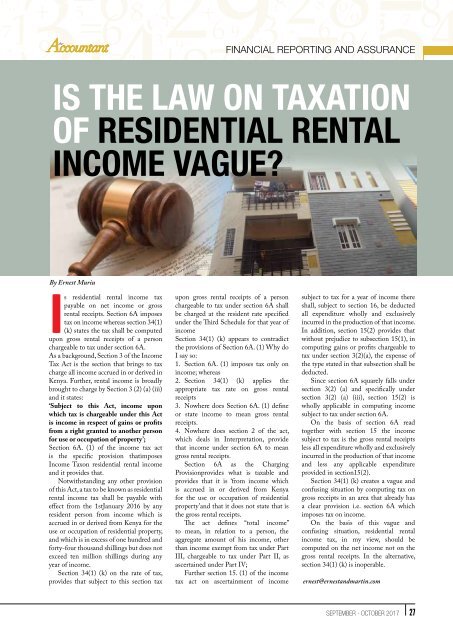The-Accountant-Sep-Oct-2017-Final
Create successful ePaper yourself
Turn your PDF publications into a flip-book with our unique Google optimized e-Paper software.
Financial Reporting and Assurance<br />
IS THE LAW ON TAXATION<br />
OF RESIDENTIAL RENTAL<br />
INCOME VAGUE?<br />
By Ernest Muriu<br />
Is residential rental income tax<br />
payable on net income or gross<br />
rental receipts. Section 6A imposes<br />
tax on income whereas section 34(1)<br />
(k) states the tax shall be computed<br />
upon gross rental receipts of a person<br />
chargeable to tax under section 6A.<br />
As a background, Section 3 of the Income<br />
Tax Act is the section that brings to tax<br />
charge all income accrued in or derived in<br />
Kenya. Further, rental income is broadly<br />
brought to charge by Section 3 (2) (a) (iii)<br />
and it states:<br />
‘Subject to this Act, income upon<br />
which tax is chargeable under this Act<br />
is income in respect of gains or profits<br />
from a right granted to another person<br />
for use or occupation of property’;<br />
Section 6A. (1) of the income tax act<br />
is the specific provision thatimposes<br />
Income Taxon residential rental income<br />
and it provides that.<br />
Notwithstanding any other provision<br />
of this Act, a tax to be known as residential<br />
rental income tax shall be payable with<br />
effect from the 1stJanuary 2016 by any<br />
resident person from income which is<br />
accrued in or derived from Kenya for the<br />
use or occupation of residential property,<br />
and which is in excess of one hundred and<br />
forty-four thousand shillings but does not<br />
exceed ten million shillings during any<br />
year of income.<br />
Section 34(1) (k) on the rate of tax,<br />
provides that subject to this section tax<br />
upon gross rental receipts of a person<br />
chargeable to tax under section 6A shall<br />
be charged at the resident rate specified<br />
under the Third Schedule for that year of<br />
income<br />
Section 34(1) (k) appears to contradict<br />
the provisions of Section 6A. (1) Why do<br />
I say so:<br />
1. Section 6A. (1) imposes tax only on<br />
income; whereas<br />
2. Section 34(1) (k) applies the<br />
appropriate tax rate on gross rental<br />
receipts<br />
3. Nowhere does Section 6A. (1) define<br />
or state income to mean gross rental<br />
receipts.<br />
4. Nowhere does section 2 of the act,<br />
which deals in Interpretation, provide<br />
that income under section 6A to mean<br />
gross rental receipts.<br />
Section 6A as the Charging<br />
Provisionprovides what is taxable and<br />
provides that it is ‘from income which<br />
is accrued in or derived from Kenya<br />
for the use or occupation of residential<br />
property’and that it does not state that is<br />
the gross rental receipts.<br />
<strong>The</strong> act defines “total income”<br />
to mean, in relation to a person, the<br />
aggregate amount of his income, other<br />
than income exempt from tax under Part<br />
III, chargeable to tax under Part II, as<br />
ascertained under Part IV;<br />
Further section 15. (1) of the income<br />
tax act on ascertainment of income<br />
subject to tax for a year of income there<br />
shall, subject to section 16, be deducted<br />
all expenditure wholly and exclusively<br />
incurred in the production of that income.<br />
In addition, section 15(2) provides that<br />
without prejudice to subsection 15(1), in<br />
computing gains or profits chargeable to<br />
tax under section 3(2)(a), the expense of<br />
the type stated in that subsection shall be<br />
deducted.<br />
Since section 6A squarely falls under<br />
section 3(2) (a) and specifically under<br />
section 3(2) (a) (iii), section 15(2) is<br />
wholly applicable in computing income<br />
subject to tax under section 6A.<br />
On the basis of section 6A read<br />
together with section 15 the income<br />
subject to tax is the gross rental receipts<br />
less all expenditure wholly and exclusively<br />
incurred in the production of that income<br />
and less any applicable expenditure<br />
provided in section15(2).<br />
Section 34(1) (k) creates a vague and<br />
confusing situation by computing tax on<br />
gross receipts in an area that already has<br />
a clear provision i.e. section 6A which<br />
imposes tax on income.<br />
On the basis of this vague and<br />
confusing situation, residential rental<br />
income tax, in my view, should be<br />
computed on the net income not on the<br />
gross rental receipts. In the alternative,<br />
section 34(1) (k) is inoperable.<br />
ernest@ernestandmartin.com<br />
september - october <strong>2017</strong> 27

















